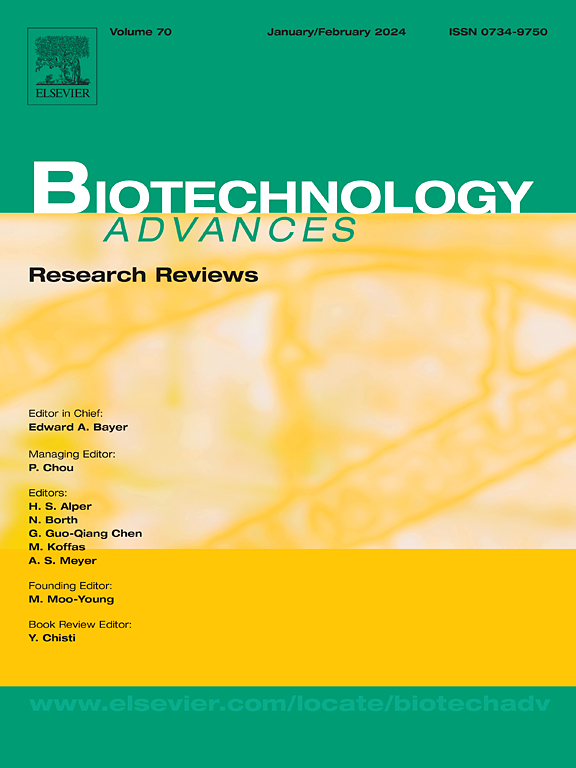Polyethylene biodegradation: A multifaceted approach
IF 12.1
1区 工程技术
Q1 BIOTECHNOLOGY & APPLIED MICROBIOLOGY
引用次数: 0
Abstract
The inert nature, durability, low cost, and wide applicability of plastics have made this material indispensable in our lives. This dependency has resulted in a growing number of plastic items, of which a substantial part is disposed in landfills or dumped in the environment, thereby affecting terrestrial and aquatic ecosystems. Among plastic materials, polyolefins are the most abundant and are impervious to biodegradation, owing to the presence of strong C![]() C and C
C and C![]() H bonds. Nevertheless, naturally occurring biodegradation of polyolefins, albeit limited, has been reported. This observation has sparked research on microbial polyolefin degradation. More efficient and targeted versions of this process could be developed also in the laboratory by designing synthetic microbial consortia with engineered enzymes. In this review, we discuss strategies for the development of such microbial consortia and identification of novel polyolefin-degrading microorganisms, as well as the engineering of polyethylene-oxidizing enzymes with greater catalytic efficacy. Finally, different techniques for the design of synthetic microbial consortia capable of successful polyolefin bioremediation will be outlined.
H bonds. Nevertheless, naturally occurring biodegradation of polyolefins, albeit limited, has been reported. This observation has sparked research on microbial polyolefin degradation. More efficient and targeted versions of this process could be developed also in the laboratory by designing synthetic microbial consortia with engineered enzymes. In this review, we discuss strategies for the development of such microbial consortia and identification of novel polyolefin-degrading microorganisms, as well as the engineering of polyethylene-oxidizing enzymes with greater catalytic efficacy. Finally, different techniques for the design of synthetic microbial consortia capable of successful polyolefin bioremediation will be outlined.

聚乙烯生物降解:一个多方面的方法。
塑料的惰性、耐用性、低成本和广泛的适用性使这种材料在我们的生活中不可或缺。这种依赖导致塑料物品的数量不断增加,其中很大一部分被弃置在垃圾填埋场或倾倒在环境中,从而影响到陆地和水生生态系统。在塑料材料中,聚烯烃是最丰富的,并且由于存在强的CC和CH键而不受生物降解的影响。然而,自然发生的聚烯烃生物降解,尽管有限,已被报道。这一观察结果引发了对微生物聚烯烃降解的研究。在实验室中,通过设计带有工程酶的合成微生物联合体,也可以开发出这一过程的更有效和更有针对性的版本。本文就聚烯烃降解微生物群的发展策略、新型聚烯烃降解微生物的鉴定以及催化效率更高的聚乙烯氧化酶的工程设计等方面进行了综述。最后,将概述设计能够成功进行聚烯烃生物修复的合成微生物群落的不同技术。
本文章由计算机程序翻译,如有差异,请以英文原文为准。
求助全文
约1分钟内获得全文
求助全文
来源期刊

Biotechnology advances
工程技术-生物工程与应用微生物
CiteScore
25.50
自引率
2.50%
发文量
167
审稿时长
37 days
期刊介绍:
Biotechnology Advances is a comprehensive review journal that covers all aspects of the multidisciplinary field of biotechnology. The journal focuses on biotechnology principles and their applications in various industries, agriculture, medicine, environmental concerns, and regulatory issues. It publishes authoritative articles that highlight current developments and future trends in the field of biotechnology. The journal invites submissions of manuscripts that are relevant and appropriate. It targets a wide audience, including scientists, engineers, students, instructors, researchers, practitioners, managers, governments, and other stakeholders in the field. Additionally, special issues are published based on selected presentations from recent relevant conferences in collaboration with the organizations hosting those conferences.
 求助内容:
求助内容: 应助结果提醒方式:
应助结果提醒方式:


